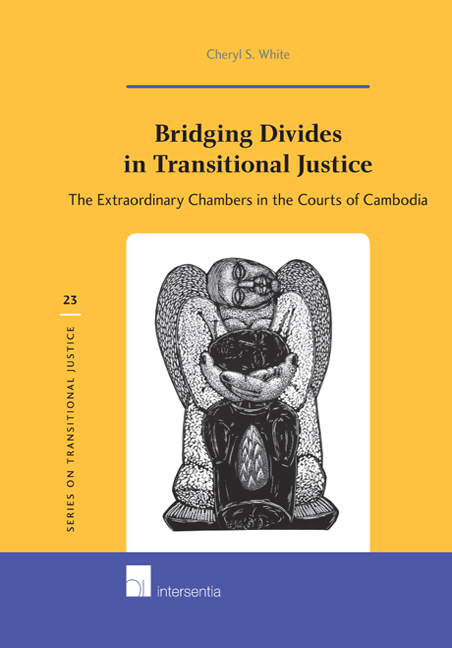Book contents
- Frontmatter
- Acknowledgements
- Contents
- Table of Cases
- Table of Legislation
- Table of Treaties
- List of Abbreviations
- Chapter 1 Introduction
- Chapter 2 Trials in Transitional Justice Theory
- Chapter 3 The Development of the Transitional Trial
- Chapter 4 The Creation of the Extraordinary Chambers in the Courts of Cambodia
- Chapter 5 Inquisitorial Criminal Procedure at the ECCC
- Chapter 6 Trial Dialogue in Case 001
- Chapter 7 The Voice of the Victim
- Chapter 8 The Voice of the Court in Judgment: Case 001
- Chapter 9 Conclusion
- Bibliography
- Index
- About the Author
Chapter 9 - Conclusion
Published online by Cambridge University Press: 27 September 2018
- Frontmatter
- Acknowledgements
- Contents
- Table of Cases
- Table of Legislation
- Table of Treaties
- List of Abbreviations
- Chapter 1 Introduction
- Chapter 2 Trials in Transitional Justice Theory
- Chapter 3 The Development of the Transitional Trial
- Chapter 4 The Creation of the Extraordinary Chambers in the Courts of Cambodia
- Chapter 5 Inquisitorial Criminal Procedure at the ECCC
- Chapter 6 Trial Dialogue in Case 001
- Chapter 7 The Voice of the Victim
- Chapter 8 The Voice of the Court in Judgment: Case 001
- Chapter 9 Conclusion
- Bibliography
- Index
- About the Author
Summary
INTRODUCTION
International criminal trials have been lauded for their expressive value. The expressivism of trials was tied to their legitimacy as impartial arbiters of fact as courts enforced international norms and modelled due process in societies transitioning to democratic governance. There is some conflation of expressivism with communication in the literature. Expressivists, for instance, argue that trials have a pedagogical or educative function. While there is a degree of overlap in the nomenclature, expressive actions and statements do not equate with, and in fact may silence, dialogue which may be essential to societal reconstruction in the aft ermath of atrocities. Shift ing the focus to communication within transitional trials speaks to the rupture caused by past violence that still affects the society. Communicative processes are not merely didactic or concerned with message-sending. Communication carries an intention to engage another with the possibility of response in some form. The distinction made in this book is that communicative trials are concerned with the exchanges between trial actors that move from the didactic to something revelatory, affirming or restorative for those taking part in the discussion, and potentially for the society observing the process.
The significance of dialogue on the past within transitioning societies has been identified in studies of the Balkans communities which were consistently critical of the non-inclusive and non-communicative approach of the ICTY towards them as primary stakeholders in the justice process. Dialogical transitional justice is more commonly associated with truth and reconciliation commissions or local justice processes. For uneasily transitioning societies like Cambodia, justice and dialogue go hand in hand, as trials open up conversation on the suppressed history of crimes. The isolation of the Cambodian people in the aft ermath of the Khmer Rouge revolution, and government policies of reconciliation by forgetting, made the communication platform within ECCC trials a means of finally confronting the societal rupture caused by the Khmer Rouge in Cambodia.
The procedural regimes engaged by courts will have considerable impact on the communicative potential of trial proceedings. This chapter revisits aspects of the ECCC's proceedings that illustrate manifestations of the elements of communication: representation and trial dialogue. To demonstrate the discursive nature of the trials, debates emerging in proceedings on the topics of trauma and the victim/perpetrator relationship in Cambodia are discussed.
- Type
- Chapter
- Information
- Bridging Divides in Transitional JusticeThe Extraordinary Chambers in the Courts of Cambodia, pp. 271 - 306Publisher: IntersentiaPrint publication year: 2017



